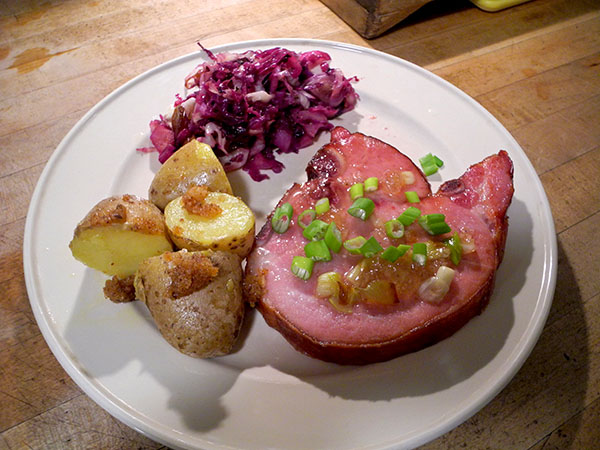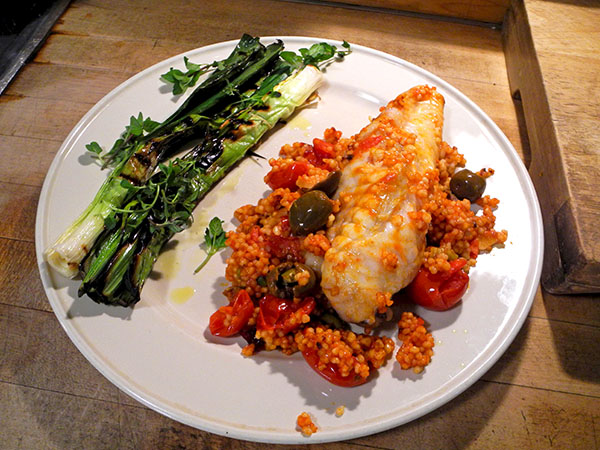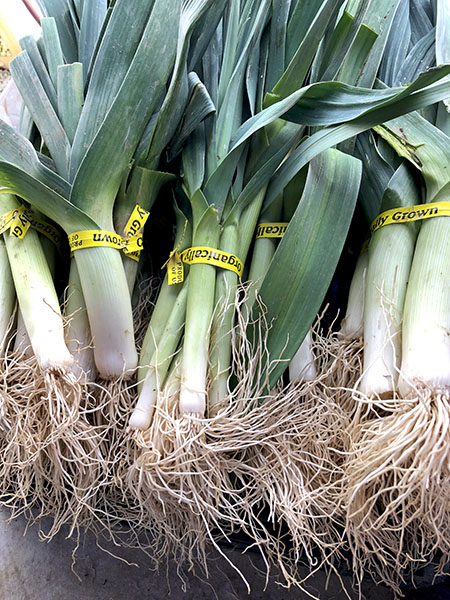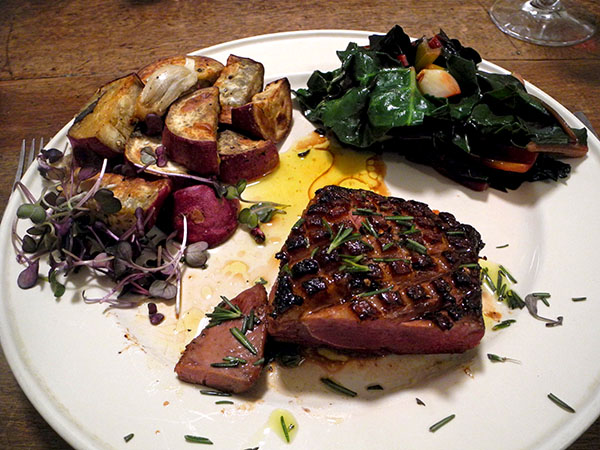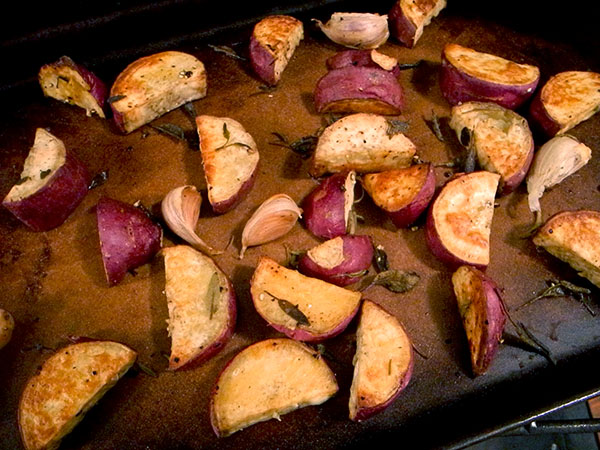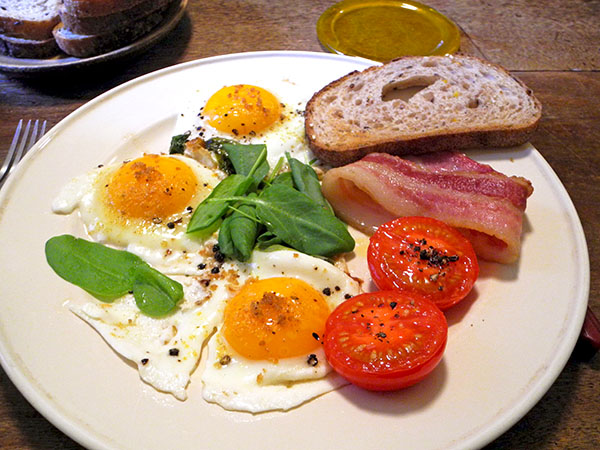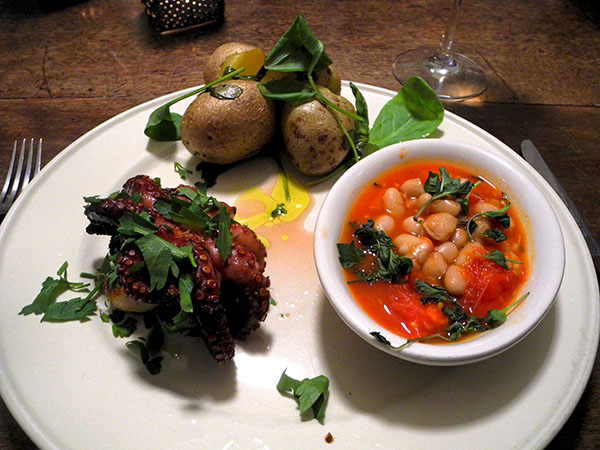
There’s no way can I properly describe this meal. To begin, there’s the miracle that I am even able to obtain octopus on a coast so rich in seafood but where this cephalopod mollusk is not found, and then actually cook it to the point of our shared satisfaction; these things already exceed my talent for expressing an appreciation of the superb dinner we enjoyed last night.
I have no idea why, unless it was for its perceived oddness, but for decades, even before I had ever actually tasted it, octopus had been my culinary ‘grail’. I went on to enjoy it many times, including in meals I prepared myself; this dinner more than succeeded in confirming and continuing my devotion.
My choice of vegetables was actually barely a choice. I thought potatoes would make sense, but I didn’t have enough of one variety for a side, so I combined 2 kinds. I had no green vegetable other than some large Brussels sprouts, which didn’t seem right. I did have some tomatoes sitting on the windowsill, which felt like a natural. Then I thought of the little bowl of cannellini beans and their juices that remained from a can I had opened for an earlier meal, but including 3 vegetables seemed like it would be a little excessive until I thought of combining tomatoes and beans; it was getting pretty late now, so I rushed to the laptop and almost immediately found this recipe, which turned out to be perfect.
- *two 6-ounce baby Italian (Sicilian?) previously-frozen octopuses from Buon Italia, marinated in the refrigerator and then on the kitchen counter for about an hour in a mixture of 1/4 cup olive oil; one teaspoon of dried Italian oregano from the Madonie Mountains in Sicily; the zest and juice of half of an organic Whole Foods lemon; 1/4 teaspoon of crushed dried Sicilian pepperoncino from Buon Italia; 1 1/2 teaspoons of salt; and one finely-chopped large Rocambole garlic clove from Keith’s Farm, the octopus removed from the mix, drained a bit and pan-grilled on high heat for 10 or 12 minutes mouth/beak side down first, then placed on 2 of its sides, with a piece of aluminum foil loosely covering the grill pan throughout because of the thickness of these octopuses, served with a squeeze of the same lemon and some olive oil, and garnished with chopped parsley from Westside Market
- *eight potatoes, half of them Nicola from Hawthorne Valley Farm and the other half German Butterball, from Norwich Meadows Farm, scrubbed and boiled, with their skins, boiled with a generous amount of salt until barely cooked through, drained, halved, dried while still inside the large still-warm vintage Corning Pyrex Flameware blue-glass pot in which they had cooked, tossed with a tablespoon or so of olive oil, sprinkled with sea salt, freshly-ground black pepper, and sorrel from Two Guys from Woodbridge
- *a tablespoon of olive oil heated inside a vintage medium size heavy high-sided tin-lined copper pot, one clove of Rocambole garlic from Keith’s Farm added and stirred in the oil until beginning to brown, then adding 6 or 8 halved Backyard Farms Maine ‘cocktail tomatoes’ from Whole Foods Market and a small sprig of rosemary from Stokes Farm, cooking them, while stirring, for about one minute, adding 2 tablespoons of a Loire sparkling wine left from service as an aperitif with a guest the night before, the mix brought to a simmer before half a can of Italian cannellini beans that had not used in a meal we enjoyed a few days earlier was added, plus about a fourth of a teaspoon of sea salt and some freshly-ground black pepper, the contents of the pot cooked for about another minute, to heat the beans through, poured into 2 oval side dishes and garnished with micro mint from Two Guys from Woodbridge
- *the wine was an Italian (Sicily) white, Valle dell Acate, Grillo ‘Zagra’, 2016, from Flatiron Wines & Spirits
- *the music was Bellini’s 1831 opera semiseria, ‘La sonnambula’, in a great recording which featured Cecilia Bartoli ,owning the role of the sleepwalker, which was written for soprano sfogato, the other leading roles performed by Juan Diego Flórez and Ildebrando D’Arcangelo, Alessandro De Marchi conducting the Orchestra La Scintilla
